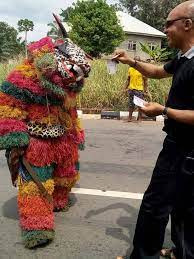Ogidi is an igbo village, the headquarters of idemili Local Government area, Anambra State, Nigeria .It has an estimated population of 70,000 and has as its neighbours abatete, nkpor, umunnachi, umuoji, ogbunike and umudioka. Ogidi is best known for its mid-July annual Nwafor Festival, an 11-day festival in July that takes place after cultivation of yams and included prayers for a good season. It usually starts on the first Friday of the
The people are known for protecting pythons, as the creature is regarded as a deity.
Ogidi means pillar.
Ogidi’s known history can be recounted for more than 450 years. The founding father of the town, Ezechumagha (born c.1550), married Anum-Ubosi; they had a son in 1580 named Inwelle. Inwelle married and had a son in 1611 named Ogidi (meaning strong pillar because he was a great warrior). Ogidi had two wives: (i) Duaja, whose children were Akanano, Uru, Ezinkwo, Umu-Udo, and Ama-Okwu; and (ii) Amalanyia, whose children were Ikenga, Nne Ogidi, Uruagu and Achalla Ogidi. After the migration of five of Ogidi’s children, the remaining four sons (Akanano, Uru, Ezinkwo and Ikenga) formed the present Ebo Ino (four quarters) of Ogidi.
History has it that Umu-Udo migrated to present-day Umunya (in Oyi Local Government of Anambra State). Ama-Okwu was either sold into slavery or got integrated into other parts of Ogidi, especially Odida in Ikenga. Nne Ogidi was married to Agulu, and is the name of a thriving village in Agulu. Uruagu migrated and settled in Nnewi, but present-day Uruagu Nnewi people deny any claim with Ogidi. Achalla Ogidi (a great elephant hunter) migrated to present-day Okija (derived from Oka Ije Achalla Ogidi).
Of the four sons who stayed in Ogidi:
Akanano had two wives. The first wife had Ire and Abo, while the second had Ezi-Ogidi and Umuru.
Uru (born c.1643) had 8 children: Ntukwulu, Ajilija, Adazi, Umudoma, Uru Ezealo, Uro Oji, Umu Anugwo, and Ogwugwuagu.
Ezinkwo had 2 sons: (a) Ogidi-Ani, who had Ogidi-Anu Ukwu and Ogidi-Ani Etiti; and (b) Nkwelle Ogidi, who had Ezinkwelle and Uru Owelle.
Ikenga had 2 wives: (a) Aghaluji Ejebe Ogu, who had Obodo Okwe and Anugwo; and (b) Ezenebo, who had Nanri and Odida. This is also the Final resting place of Chinua Achebe.
KINGSHIP
The kingship stool has historically been vested in the Amobi family. Igwe Amobi 1 of Ogidi, Walter Okafor Okerulu Nwatakwochaka Amobi (1838 – 18 December 1925), was the first ruler of Ogidi. His father, Abraham Amobi, was born in 1806. He was one of the first people to encounter the English Church missionnaires and embrace their religion when they arrived in onitsha through the river Niger He became the first catechist in Ogidi.
His son, Igwe Walter Okafor Amobi I of Ogidi, had an opportunity to learn from Christian education and culture. He was active in the palace council of the Obi of aniotcha and adjudicated in its native courts. A wealthy and prosperous noble, he was appointed as a Political Agent of Queen Victoria’s royal Niger company in 1898; he commanded a contingent of soldiers. On July 9, 1904, he became the first “Igwe of Ogidi”, in a ceremony recorded in the Colonial Administrative Intelligence Book and witnessed by colonial officers representing the government of King Edward V11 of England.
As Igwe, Amobi I was instrumental in establishing peaceful and mutually beneficial contact between the Royal Niger Company and the people of Ogidi and the greater Igbo hinterland. Though peace-loving, he was a brave, able and resolute warrior in battle and at other times of conflict. His courageous leadership earned him the respect and gratitude of his people and those of the neighbouring provinces. During this period, he was invested with the princely and ducal title of “Ozo”, in recognition of his successes against Portuguese raiders striking inland from the Niger Delta, and indigenous soldiers attacking from provinces to the north. Igwe Amobi I reigned as ruler of Ogidi for 21 years until his death on 18 December 1925.
Upon his death, Amobi I was succeeded by his eldest son, Prince Benjamin Olisaeloka Amobi. As Igwe Amobi II of Ogidi, he later represented the Colony and Protectorate of Nigeria at the coronation of King George VI of England in 1937.
During Amobi II’s long reign, he maintained cordial relations with the rulers of other kingdoms and provinces, including the Oba of Benin, the Obi of Onitsha, Ojiako Ezenne of Adazi, the Oni of Ife and the Oba of Lagos. His eldest son, (Dr.) Benedict Vincent Obiora Amobi, became Igwe Amobi III in 1975 after the death of Igwe II that year. When he died in 1986, (Engr.) Walter Nnamdi Ifediora Amobi (born March 19, 1929) ascended the throne as Igwe Amobi IV of Ogidi, serving until his death in 1998.
Walter Amobi had married Uche in Edinburgh, Scotland in 1957. They had six children, including second son, Ifediora Chimezie Amobi, born on October 1, 1960. He married and has three children, including Chastity Lynn Nwakego Grant-Amobi, born on October 27, 1982.
After Amobi IV’s death in 1998, none of his sons became a successor. In August 2016, the people of Ogidi elected a new Igwe, Alexander Uzo Onyido. Onyido is a pharmacist who was trained at Ahmadu Bello University in Zaria, Kaduna State. He rose to the rank of chief pharmacist with Kano State Government under the Federal Ministry of Health.






